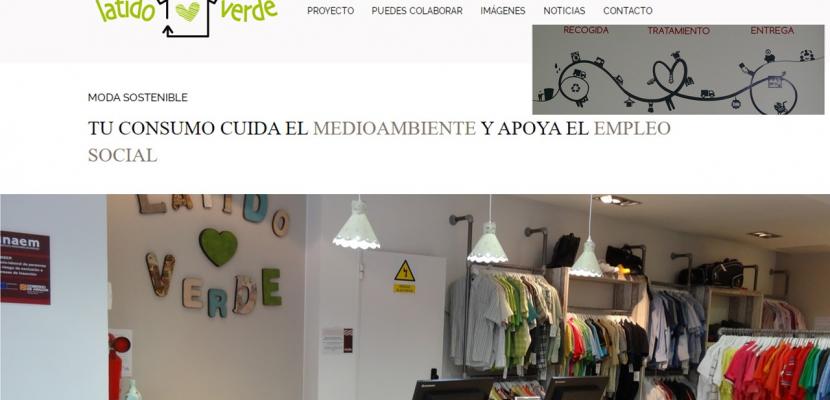
The clothing store “Latido Verde”

About this good practice
The social inclusion company A TODO TRAPO ZARAGOZA SLU collects used textiles through a network of used clothing and home textiles containers. The clothing store LATIDO VERDE is the last step in this waste management chain. It´s a real circular economy project which gives a second life to clothing and reduces landfilling of textile waste and, at the same time, offers social employment opportunities. The store also delivers clothes to families at risk of social exclusion.The main objective is the creation of social employment with an environmental perspective. It´s also a meeting point and a participation space open to the public. There, consumers play an active role in social change, promoting a social and sustainable economy.
People working in the store follow a social insertion itinerary in the labour market. It includes an accompaniment process and training coordinated by various entities. Eventually, they get a job as a shop assistant.
Internal and external training plays a key role. It allows taking on habits, strategies and knowledge, reinforces self-esteem and enhances talents. All of that without forgetting the advantage of being mentored by an insertion company that is constantly in contact with the labour market. That´s, all its services and contents are updated according to new sectoral trends.
In May 2021, they began to implement a new organizational vision based on a new style of relationships (NER), which favours the integration of people in the organisation.
Expert opinion
Resources needed
• Co-funded by the EU Social Fund and Caritas Zaragoza.
• The facility: €24,000, adding €25,000 for improvements and adaptation works.
• The store has 5 workers at risk of social exclusion.
• Team at 35% of their working day: 1 Insertion Technician, 1 Coordinator and 1 Administrator / Marketer.
Evidence of success
• More than 43,000 reused clothing have been sold, reducing (1) CO2 emissions, (2) the consumption of raw materials for new garments and (3) the deposit of used garments in landfills.
• As for the social integration program, 450 families have been assisted and 7,500 reused clothing have been delivered.
• Five permanent jobs have been created in the store.
• The percentage of insertion in the labour market at the end of the itineraries is 62.96%.
• ISO 14001 environmental accreditation.
Potential for learning or transfer
The possibilities of transferring the model (sales of second-hand goods) are high since there is a growing awareness among citizens of the use of second-hand clothing. In addition, it is foreseen an increase in selective collection, in order to comply with regulatory obligations.
Differences in collection and gathering of clothes, the type of employment contract (in this case it is specific to insertion companies) and the development of insertion itineraries must be taken into account.
Further information
Website
Good practice owner
You can contact the good practice owner below for more detailed information.
Cáritas Diocesana de Zaragoza

